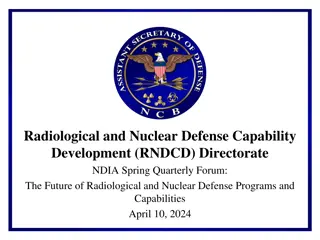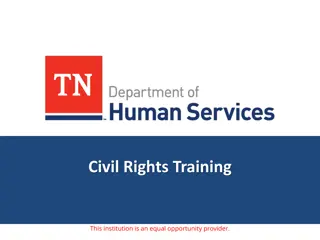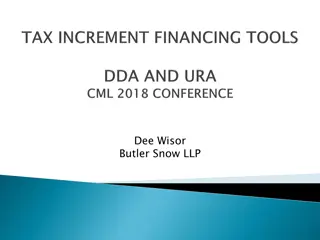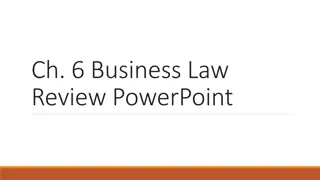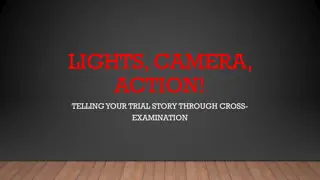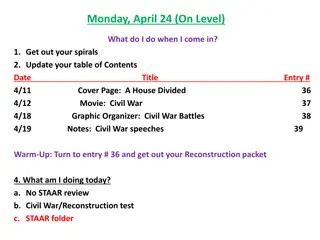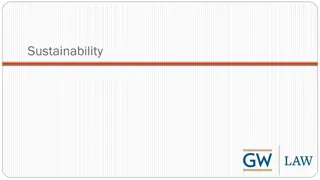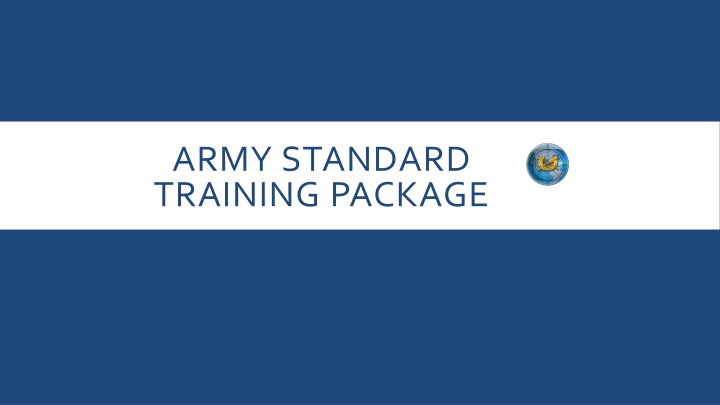
Defense Support of Civil Authorities and Homeland Defense Overview
Explore the essential concepts of Defense Support of Civil Authorities (DSCA) and Homeland Defense (HD). Learn about the roles, principles, and definitions governing the involvement of the Department of Defense (DoD) in domestic affairs, emergencies, and critical infrastructure protection. Understand the distinctions between DSCA and HD, including the support provided by federal military forces, DOD civilians, and NG forces in response to various types of emergencies and events. Discover the National Response Framework's role in coordinating disaster and emergency response efforts nationwide.
Download Presentation

Please find below an Image/Link to download the presentation.
The content on the website is provided AS IS for your information and personal use only. It may not be sold, licensed, or shared on other websites without obtaining consent from the author. If you encounter any issues during the download, it is possible that the publisher has removed the file from their server.
You are allowed to download the files provided on this website for personal or commercial use, subject to the condition that they are used lawfully. All files are the property of their respective owners.
The content on the website is provided AS IS for your information and personal use only. It may not be sold, licensed, or shared on other websites without obtaining consent from the author.
E N D
Presentation Transcript
ARMY STANDARD TRAINING PACKAGE
DEFENSE SUPPORT OF CIVIL AUTHORITIES (DSCA)
GENERAL PRINCIPLES DSCA Involvement by DoD in any domestic affair is the exception to the general rule DoD s involvement in DSCA is tightly controlled by statute and regulation DoD will usually be subordinate to other civilian authority
DODS VIEW Homeland Security of Civil Authorities Defense Support Homeland Defense Emergency Preparedness
DEFINITION Homeland Defense (HD) is the protection of United States sovereignty, territory, domestic population, and critical infrastructure against external threats and aggression or other threats as directed by the President. It is generally considered to consist of war- fighting missions led by the DoD.
DEFINITION Defense Support of Civil Authorities (DSCA) is support provided by federal military forces; DOD civilians; DOD contract personnel; and DOD component assets, to include NG forces (when SecDef, in coordination with the Governors of the affected States, elects and requests to use and fund those forces in their status under Title 32 of the United States Code), in response to a request for assistance (RFA) from civil authorities for domestic emergencies, cyberspace incident response, law enforcement support, and other domestic activities or from qualifying entities for special events.
DOD LEAD, SUPPORT, ENABLE -Lead: Defend the U.S. from attack (Homeland Defense) -Support: At the direction of the President or the Secretary of Defense, engage in support of civil authorities [Defense Support of Civil Authorities (DSCA)] -Enable: Enhance capabilities and contributions of domestic and foreign partners
NATIONAL RESPONSE FRAMEWORK (NRF) The National Response Framework is a guide to how the Nation responds to all types of disasters and emergencies. It is built on scalable, flexible, and adaptable concepts identified in the National Incident Management System to align key roles and responsibilities across the Nation. The National Response Framework describes the principles, roles and responsibilities, and coordinating structures for delivering the core capabilities required to respond to an incident and further describes how response efforts integrate with those of the other mission areas. National Response Framework Fourth Edition October 28, 2019 This Framework is always in effect and describes the doctrine under which the Nation responds to incidents.
DEFENSE COORDINATION OFFICERS AND FEMA REGIONS
POSSE COMITATUS ACT 18 U.S.C. 1385 Whoever, except in cases and under circumstances expressly authorized by the Constitution or Act of Congress, willfully uses any part of the Army, the Navy, the Marine Corps, the Air Force, or the Space Force as a posse comitatus or otherwise to execute the laws shall be fined under this title or imprisoned for not more than two years, or both. 2 1 4 3 5
1 EXCEPTIONS Expressly Authorized by Constitution Art. 2 2, Powers as Commander in Chief Military Purpose Doctrine Court-recognized exception Primary purpose of furthering a military interest (benefit to civilian authorities is incidental) Investigations and enforcement of UCMJ Protection of DoD personnel and equipment
1 EXCEPTIONS Expressly Authorized by Constitution Art. 4 4, U.S. shall . . . protect each [State] against invasion; and on Application of the (State) Legislature, or of the Executive (when the Legislature cannot be convened) against domestic violence.
2 EXCEPTIONS Expressly Authorized by Congress Chapter 13, Insurrection 10 U.S.C. 251-255 Permits the use of Federal armed forces or Federalized militia to restore law and order to: Support State Request against insurrection ( 251) Enforce Federal Authority or suppress rebellion ( 252) Protect Constitutional Rights, enforce U.S. law ( 253)
3 APPLICATION Who Active duty Army, Navy, Marine Corps, Air Force, and Space Force What about Reserve? What about National Guard?
3 ARMY OR AIR FORCE Reservists and National Guard? Reservists (USAR, USNR, USMCR, USAFR): YES, if serving in a duty status (Reservists serve only in Federal, Title 10, status). National Guard: NO, if under State control in Title 32 or State Active Duty status. YES, if in Federal (Title 10) status.
POSSE COMITATUS TO EXECUTE THE LAWS? 4 10 U.S.C. 275 requires DoD prescribe regs ensuring no direct participation in search, seizure, arrest, or similar activity unless otherwise authorized by law DoDI 3025.21: prohibits direct assistance to civilian law enforcement officials What is direct assistance
5 POSSE COMITATUS ACT Effects of violation Fine Imprisonment for not more than two years, or both No history of prosecution
5 POSSE COMITATUS ACT Effects of violation Exclusionary Rule Failure to prove an element Dismissal of charges
Defense Support of Civil Authorities (DSCA) DoDD 3025.18 Civil Emergencies Law Disturbances Enforcement
DODD 3025.18 Governs all DoD military assistance to civil authorities Evaluation criteria for requests (CARRLL Factors) Cost: Who pays; impact on DoD budget. Appropriateness: Whether the requested mission is in the interest of DoD to conduct. Risk: Safety of DoD Forces. Readiness: Impact on DoD s ability to perform its primary mission. Legality: Compliance with laws. Lethality: Potential need for lethal force by or against DoD Forces.
UMBRELLA Defense Support of Civil Authorities Civil Emergencies Law Enforcement DoDI 3025.21 Disturbances
DODI 3025.21 DIRECT ASSISTANCE 4 Defines prohibited direct assistance as: Interdiction Search or seizure Arrest, apprehension, stop and frisk Use of personnel surveillance or pursuit of individuals, or as undercover agents, informants, investigators, interrogators
INDIRECT ASSISTANCE 10 U.S.C. Chapter 15 ( 271-284) Military Support for Civilian Law Enforcement Agencies - Information sharing - Use of military equipment - Training and advising (basic v. advanced military skills) - Maintenance and operation of equipment - WMD support ** approval authority varies
SUPPORT TO LAW ENFORCEMENT FUNDING Reimbursable UNLESS: Provided in the normal course of training or operations; OR The support results in substantially equivalent training value
UMBRELLA Defense Support of Civil Authorities Law Emergencies Civil Enforcement Disturbances DoDI 3025.21
CIVIL DISTURBANCES President s Authority: Constitution Art. 4 4 Insurrection Act 10 U.S.C. 251-255 DoD Authority: DoDD 3025.18; DoDI 3025.21 DOJ in charge ASD/HD&ASA Exec. Agent Emergency Authority
1. Units and members of U.S. Armed Forces and Federal Law Enforcement Officers will be used to suppress violence and restore law and order. 2. SecDef may use the active forces and may Federalize NG. SecDef will follow LE policies as the Attorney General (AG) may determine. 3. The AG is authorized to coordinate activities of all assisting Federal agencies. SecDef may determine when Federal military members shall be withdrawn. 4.
DOD RESPONSE TO CIVIL DISTURBANCES SECDEF is approval authority Civil Authorities have primary responsibility, but military forces remain under military command and control Emergency employment of military forces Prevent loss of life or wanton destruction Protect Federal property or Federal Government functions
UMBRELLA Defense Support of Civil Authorities Law Civil EMERGENCIES DoDD 3025.18 Enforcement Disturbances
DISASTER/EMERGENCY The Stafford Act Presidential Action 10-day window Declaration of a major disaster Declaration of an emergency
TYPES OF SUPPORT Personnel, equipment, supplies, facilities, and advisory services Lending equipment Services essential to saving lives and protecting/preserving property, public health, and safety
IMMEDIATE RESPONSE AUTHORITY Authority DoDD 3025.18 Authorizes local military commanders to take action to save lives, prevent human suffering, or mitigate great property damage Imminently serious conditions Time does not permit approval from higher HQ Cannot perform law enforcement functions
IMMEDIATE RESPONSE AUTHORITY Higher HQ HELP ! CONUS REPORT CIVIL LOCAL COMMANDER AUTHORITY - SAVE LIVES - PREVENT HUMAN SUFFERING - MITIGATE GREAT PROPERTY DAMAGE DISASTER SITE ISSUES: - 72 HOURS - REPEATED USE PERSONNEL/ RESOURCES
IMMEDIATE RESPONSE AUTHORITY Support authorized includes: Rescue, evacuation, emergency treatment of casualties Emergency restoration of power, water, transportation Food distribution Provided on a cost-reimbursable basis
KEY TAKEAWAYS Involvement by DoD in any domestic affair is the exception to the general rule DoD s involvement in DSCA is tightly controlled by statute and regulation DoD will usually be subordinate to other civilian authority

![❤[PDF]⚡ Civil War Talks: Further Reminiscences of George S. Bernard and His Fel](/thumb/20551/pdf-civil-war-talks-further-reminiscences-of-george-s-bernard-and-his-fel.jpg)


